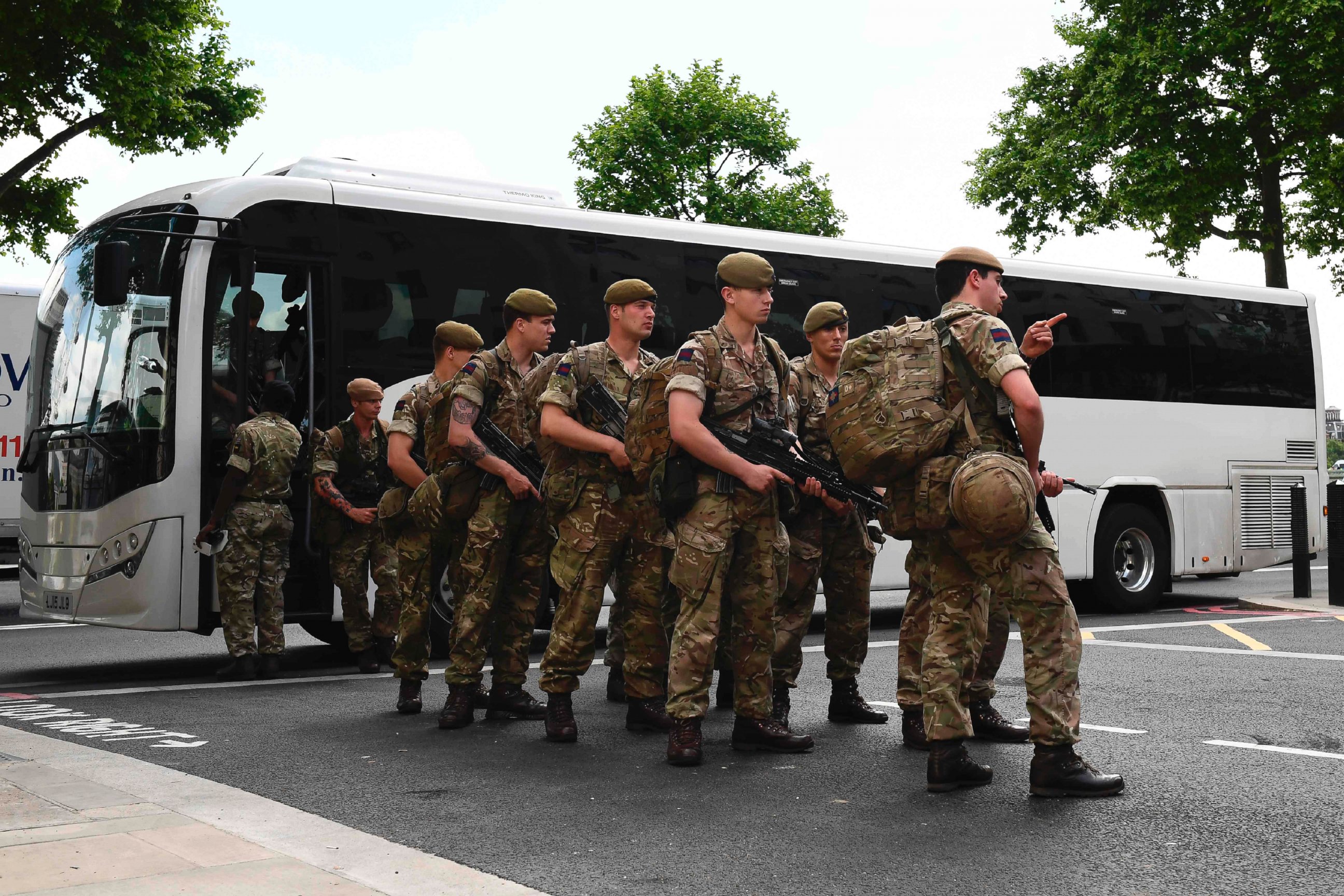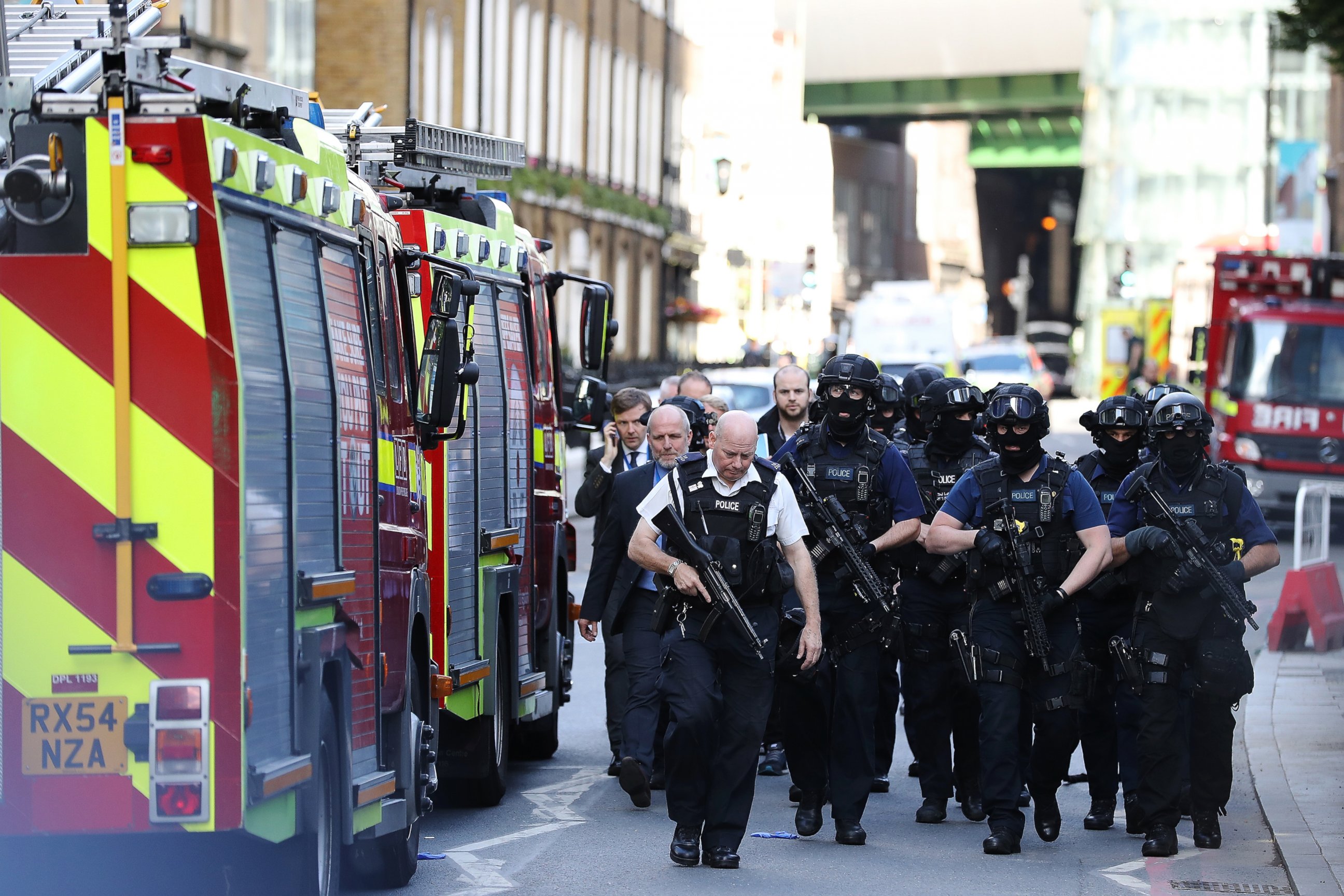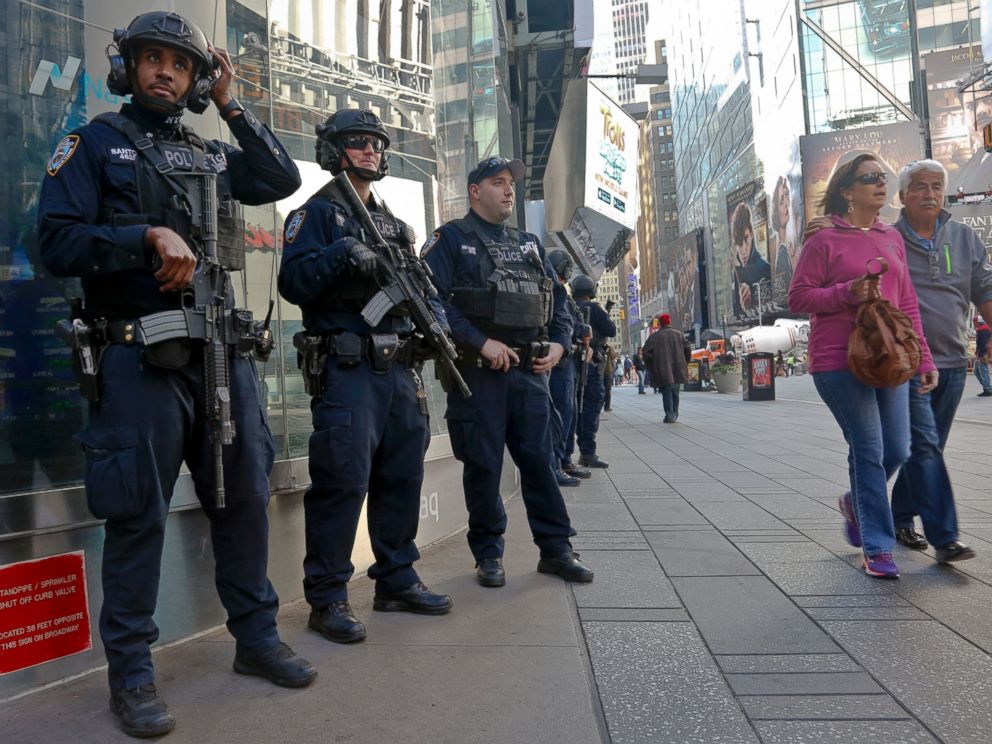How experts say we can try to cope with 'this level of terrorism'
The number of high-profile attacks in Europe is on the rise, experts say.
— -- The terrorist attack in London that killed seven people and left dozens more injured came less than two weeks after a suicide bombing at a concert in Manchester and on the heels of attacks in the Philippines, Egypt, Indonesia, Pakistan, and France earlier this year.
Given the number of high-profile attacks inspired, directed or claimed by the Islamic State group, many are asking whether the public must become used to a certain level of terrorism in their lives.
"It's unfortunate, but yes, at least in certain countries, we will have to get used to this level of terrorism until we do the things that are required for us to effectively deal with this generational challenge," Barry Pavel, senior vice president at the Atlantic Council who worked on defense policy for both the George W. Bush and Barack Obama administrations, told ABC News.
And while recent attacks in Europe have dominated media coverage, terrorism is not a new problem, Dr. Maria Haberfeld, professor of police science at John Jay College of Criminal Justice in New York, told ABC News.
"It doesn't differ from any of the other crimes we are dealing with in the sense that it's not new, it's been around for generations and we have huge numbers of terrorist groups around the world and people who are attracted to this type of criminality," Haberfeld said. "We have more of an exposure to this now because of social media networks, but it's certainly not any more severe than it used to be years ago in different areas of the world."

A changing threat
But the number of high-profile attacks in Europe is on the rise, Dr. Karen Greenberg, the director of the Center for National Security at Fordham Law School in New York, told ABC News.
"There has been more than a dozen events in Europe in recent months, and so the frequency of these events is gaining speed," Greenberg said. "There is legitimately heightened concern in the wake of these attacks and in the wake of the frequent use of these non-sophisticated tactics."
Greenberg said those non-sophisticated tactics have included using everyday objects such as cars, knives or homemade bombs to kill and injure people, rather than relying on access to more advanced weaponry. The attackers in London on Saturday used a rented van and knives to attack the public. Such attacks using everyday objects can sometimes spur more fear than terrorists using more sophisticated weapons, Greenberg said.
"It's textbook terrorism: Make people afraid," Greenberg said. "This is an attack on a way of life and if you're attacking a way of life, you want people to be concerned as they go about their daily lives so that they won't be able to do anything or have their children do anything in safety."
She said the increase in these attacks may have to do with statements made by the leader of ISIS, Abu Bakr al-Baghdadi, as well as al-Qaeda's Hamza bin Laden, urging people to use whatever is available to sow terror.
"Al-Baghdadi and bin Laden both made references to a similar kind of tactic of picking up whatever you can weaponize where you are to commit an act of terrorism," Greenberg said.
How the public can help
But it's important that bystanders know they can also use everyday objects to fight back in some cases, according to Haberfeld, who served in the Israel Defense Forces in a counter-terrorist unit as well as in the Israel National Police.
"There is no end to this, so mobilizing the public to resist, not just run and hide, is the way to go," Haberfeld said.
If attackers are wielding knives, throwing objects can be effective in slowing them down or stopping them until law enforcement arrives, she added. At least one man said he threw furniture at the London attackers to try to slow them down, according to The Associated Press.
"At any given moment, the public grossly outnumbers any type of lone wolf or group of terrorists," Haberfeld said. "If people understand that it's on them as well, then you don't really have to coordinate because people will know what to do. So whatever I have -- whether it's a high-heel shoe, a heavy purse, a bottle of wine -- I will start throwing it in that direction."

Haberfeld stressed that bystanders should have a different response to attackers armed with guns or explosive devices.
"If you suddenly see three guys who are heavily armed then, of course, run away. But knives, this is something we can handle as the public," she said.
Haberfeld, who moved to Israel as a teenager and frequently conducts research there, said people in other countries who are used to living with an increased risk of terrorism learn to be more active and alert in preventing it.
"People [in Israel] are much more aware. Nobody is dropping a backpack next to somebody like in the Boston Marathon bombing and leaving because that person would immediately be stopped by the public before even law enforcement arrives at the scene," Haberfeld said. "But there is also a lot of private security. You cannot enter a movie theater or department store in a mall without going through security. This is a function of dealing with terrorism and securing soft targets."
Haberfeld said that in many cases, European leaders have worked to secure these soft targets too late: after an attack occurs.
Greenberg, who wrote "Rogue Justice: The Making of the Security State," said the U.S. response to terrorism has been mostly reactive since the Sept. 11, 2001, terrorist attacks.
"It's been, 'What did this tell us? What did that tell us?'" Greenberg said. "It would be so nice if law enforcement agencies and people in the security community could take a step back and really, without being under the gun, think about these things and reflect on them. And there hasn't really been a chance to do that."
Greenberg said the U.S. should work to form a national commission of experts on violence in America that looks at all different kinds of threats, including those from right-wing extremists like Jeremy Joseph Christian, who attacked people with a knife on a Portland, Oregon, train last month.
"So far, the limited focus on Muslims has not served us well," Greenberg said. "Violence seems to be to be much more systemic throughout society than that."
Gathering intelligence while protecting civil liberties
A frequent question that has been raised in the debate over how to prevent terrorism is whether societies can be both completely free and completely safe. The police departments of several major cities have come under fire from the ACLU and other civil liberties groups in recent years for their surveillance of mosques.
In both the Manchester and London attacks, people later came forward to say they had spoken to police about some of the suspects and raised concerns about their behavior. But questions remain as to why that information and the police response to it wasn't enough to prevent the incidents themselves.
Greenberg said focusing on the quality rather than quantity of information received by law enforcement is crucial to evaluating threats while protecting civil liberties.
"What happens when you get too much information is it's too hard to focus on any particular thing. So it's really incumbent on law enforcement to know what to take seriously and what not," Greenberg said. "If someone is threatening a terrorist attack, that's something to take seriously. And law enforcement officials and intelligence officials do, in the course of their training, learn how to discriminate when they meet individuals about guilt and innocence, and they're pretty good at it."
"So it's about giving them the tools to be better at it and not say, 'OK, everyone now needs to take a certain kind of litmus test, now everyone's emails have to be swept up.' It's not about that. It's smart security that is important, and smart security and protecting individual freedoms happen to be the same thing: they're about focus, individuality, specifics, and facts," she added.
Haberfeld said the model of community policing relies on people helping the police because there is only so much law enforcement can do.
"This is not something that can be resolved by closing the borders or hiring more police officers. This is much more complicated and complex than that," Haberfeld said. "The public is the key to success both in terms of prevention and minimizing the aftermath."

Foreign policy implications
Pavel said there are near-term tactical issues and longer-term strategic issues that need to be tackled in order to reduce the threat of terrorism in the U.S. and Europe.
"The near-term tactical issue that's critical is we need to end the war in Syria. Until we end the war in Syria, it's going to keep being the global incubator for extremism and terrorism," Pavel said. "I'm not saying that every single attack is related somehow to Syria, but it affects a lot of them. It's a global problem and not a regional problem.
"When people understand that the chance of an attack in our societies goes down by a lot if we can do what it takes to help resolve that far-away, distant, horrific crisis, then we will all be better off," he added.
Pavel said "ungoverned spaces" in Libya and Yemen, as well as a political crisis in Egypt, also require attention.
"When we hear this term 'America first,' I think 'America first' has to include killing bad guys far from our shores. I would much rather do that there than here. Because if they're here, then we're behind the game," Pavel said.
But military intervention can also create more problems than it solves, Pavel said.
"Look at the invasion of Iraq, which, in my mind, was one of the most disastrous blunders in the history of the United States. Look what's become of Iraq and the threats that emanate from there, which are very different from the threats before. In some ways, they're more infectious," Pavel said. "So we need to make sure we don't overuse the military tool. We need to really resource our civilian arms of power, which include diplomacy, economics, the private sector, and cultural exchanges."
In the longer term, world leaders must start addressing the factors that draw people to extremism in the first place.
"There's also alienation in our societies. So how do we better integrate people in London, in Paris, in Brussels? How do we do a better job of having a heterogeneous society that reflects people of different backgrounds and faiths and doesn't make the problem even worse?" he said.
"Longer term, we have to reduce the isolation, provide economic opportunities and work with our allies and partners," Pavel added. "There's no other way."




